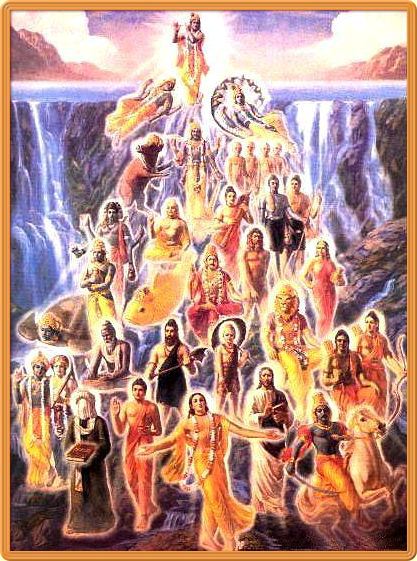
Let us understand the theological meaning of this term, keeping aside it's secondary and commercially derived meanings
The concept of avatara has been a subject matter for many of the civilizations from ancient times. Though the word avatara is immensely popular even amongst the naive, it is least understood. Different religious adepts put it in different ways. Masses are caught up in one of the two extremes – one that there is no avatara, and other that everyone is or can be an avatara.
The Vedic treatises explain in great detail the concept of avatara. In fact, it is said that there are countless avataras (avatara hy asankhyeya), like rivulets flowing from inexhaustible sources of water (yathavidasinah kulyah sarasah syuh sahasrasah) (Bhag. 1.3.26).
In the Caitanya-caritamrita of Krishnadasa Kaviraja, the following verses (Madhya 20.263-264) summarize these principles of incarnation:
The avatara, or incarnation of Godhead, descends from the kingdom of God for material manifestation. And the particular form of the Personality of Godhead who so descends is called an incarnation, or avatara. Such incarnations are situated in the spiritual world, the kingdom of God. When they descend to the material creation, they assume the name avatara.”
What the Avatara Says about Himself
The Supreme Lord Krishna speaks in Bhagavad-gita (6.4), the science of His descent. ajo ’pi sann avyayatma bhutanam isvaro ‘pi san prakatia svam adhinohaya sambhavamy atma-mayaya
“Although I am unborn and My transcendental body never deteriorates, and although I am the Lord of all living entities, I still appear in every millennium in My original transcendental form.”
Through this verse Lord Krishna laid down the bedrock for erecting the edifice of the science of avatara. This science is the major episode of every epoch, for it decides the governing climate for the whole millennia. The avatara paves the compatible path to achieve the purification and the perfection of one’s existence that the populace of a particular epoch is expected to pursue.
Lord Krishna speaks in this verse that He, although unborn (aja), takes “birth” (sambhavami) in this world. As we know, Lord Rama was born to Dasaratha and Kausalya, Lord Vamana to Kasyapa and Aditi, and Krishna to Yasoda and Nanda. An academic study of Vedic scriptures makes us think that these people, who could be titans of their time, were just homo-sapiens after all. Such conjectures are widely preached through the means of popular TV shows, novels and so forth. When the scriptures attribute superhuman qualities to Vedic characters, the academia is quick to dismiss them as mythology – to be believed by those who know nothing more than quills and parchments.
But in the above verse, the world aja is of paramount importance. What comes into being is matter and what ends is matter. That which never comes into being but eternally exists is spirit, or antimatter. The Lord is a completely spiritual Supreme Being. His body transcends the limitations embedded in our material bodies. Being spiritual He always exists, beyond time and space, and thus beyond birth and death. That is why Krishna uses the word api (“although” to infer that He being unborn still “takes birth”). This implies that He doesn’t take birth as an ordinary child with a material body, resulting from mutual conception; rather the Lord descends in His own original spiritual body.
Krishna’s body brimming with all potencies can appear just as an infant baby or an adult. But all of these are original forms of the Lord. As a seven-day baby sucking the life of the behemoth witch Putana or standing amidst the phalanxes of brutal warriors speaking mature instructions to Arjuna, Lord Krishna was the same original person exhibiting different shades of spectrum of transcendental form.
The Avatara’s Disappearance
Before we dismiss an avatara’s disappearance as an ordinary death lacking divinity, let us understand death itself, the most dreaded moment of everyone’s life. The Bhagavad-gita (2.13) explains that death is the transmigration of the soul from one body to the next. The material sheath is removed and the soul, the actual person, gets a fresh one. Superficially it may appear that the material body is finished, but it is not so. The body is just a covering that changes at the time of death.
In the case of an avatara, however, He has no material body but is a completely spiritual supreme being, without a body made of matter covering Him. Therefore He has no death (and no birth too) because there is nothing material about His existence.
How does the avatara leave the earth is therefore a colossal hurdle to the matter-bound minds. The academic scholars would want us to believe that an avatara is just another human having some extra wizardry and prowess that is not present in others. His leaving the world is like the death of any ordinary human being, they argue.
His disappearance from the surface of material plane simply means that, after accomplishing His mission, He goes back to His abode along with His associates. srila Prabhupada explains how Krishna’s pastimes in Vrindavan and Dvaraka are passing through the universe just as the sun passes over the face of the earth. The pastimes beginning from His birth up to mausala-lila are performed differently in different universes. The same is the case with Lord Rama and other incarnations. In the above verse the Lord conveys this deep import by the word avyayatma, the Self that never terminates.
God and the Living Entity:One or Different?
Scriptures assert that every being that manifests consciousness is a fragmental particle of the Lord. We are spirit souls, possessing the same nature as that of the Lord in a minute quantity. Thus the words aja and avyaya are also applicable to the spirit soul. We, and not our bodies with which we wrongly identify ourselves, are constitutionally eternal as the Lord. So, does it imply that avatara and all beings are sharing the same podium, one speaking and others just quietly waiting for their turn, one aware of his “godliness” and others yet to wake up?
Some schools of thought do indoctrinate this viral notion. We all are God but have forgotten our identity, they proclaim. Lord Krishna dismisses this idea by saying bhutanam isvaro ‘pi san: “I am the Lord of all living entities.” The Lord descends into this world where His subordinate particles struggle hard to make sense of everything foreign around them and He lives with them almost on a same human scale. But even then, constitutionally, He is the master of everyone.
Lord Rama, for instance, was apparently on the same scale as any terrestrial prince. But then, He had performed superhuman tasks like breaking the celestial bow and building the bridge. Krishna, as an infant baby, killed powerful mystic demons, and at the age of seven lifted the massive Govardhana Mountain – something impossible for children of this age. All that to be understood here is, though the Lord descends within human society and performs human-like activities, He remains the supreme worshipable Lord of everyone. The CEO of a company may behave with his employees like an ordinary person, but that does not diminish his position. Similarly, when an avatara descends on earth, He never falls from His transcendental position.
Form or Formless:
The Perennial Debate The verse continues, prakritim svam adhisthaya: “I appear in my original transcendental form.” Whether God has a form or not – there have been endless arguments over this question. The Vedic scriptures tell us that God has a form and is also formless at the same time. The impersonal Brahman effulgence is the formless aspect of His existence, whereas His eternal form in the various Vaikunöha planets is the aspect of His personal existence. Lord Krishna, however, in Bhagavad-gita (14.27) declares that the impersonal effulgence rests on His divine personal form and is therefore inferior. He advises Arjuna to not waste His time meditating on something formless; “worship Me,” Krishna tells him directly.
The two-handed, three-fold bending form of Krishna is not a product of human imagination, fashioned in a way our minds can comprehend and relate to. In fact, our forms are fashioned according to Krishna’s divine form. As a person, would He not be possessing personal attributes and traits? Undeniably yes, and this is stressed in the last line of the verse under discussion. Krishna says, sambhavamy atma-mayaya: “I appear out of My causeless mercy.”
As individual spirit souls, we have thoughts, feelings and desires. This is because the Almighty has His individual thoughts, feelings and desires. Being the super-sentient person, the source of everything, how could He be bereft of them? It is a fashion among secular religionists and modern philosophers to advocate that God is ultimately formless and impersonal, without any individuality. Such unfounded claims destroy our natural loving propensity towards God, our supreme loving Father. If there is no one to listen to our prayers, no one who can reciprocate with our loving offerings, if all that is there is the extremely grave Brahman that entertains no one but mighty ascetics who have realized that this world along with its feelings are false, then our hearts will get buried inside the arid path of denial. We may become rebellious toward God, unable to recognize and appreciate His supreme love, the love that we are all yearning for.
Coming Down to Exchange Love
Primarily the Lord descends to this world for three purposes, as He says in the Bhagavad-gita (4.8), paritranaya sadhunam vinasaya ca duskrtam dharma samsthapanarthaya sambhavami yuge yuge: “To deliver the pious and to annihilate the miscreants, as well as to reestablish the principles of religion, I Myself appear, millennium after millennium.” srila Prabhupada writes in his purport, “As far as the atheistic are concerned, it is not necessary for the Supreme Lord to appear as He is to destroy them, as He did with the demons Ravana and Kansa. The Lord has many agents who are quite competent to vanquish demons. . . But the Lord especially descends to appease His unalloyed devotees, who are always harassed by the demoniac.”

We need to understand that God is a person with deep and extremely sensitive feelings, not just the Almighty autocratic power. He descends to reciprocate with the loving call of His devotee. He enjoys dealing with His devotees in various relations and thus relish diverse mellows with them. He agrees to become a lover, son, friend, brother or even a rival in order to savor the mellows arising through mutual reciprocations with His devotees. By exhibiting gorgeous enchanting activities, we get a chance to awaken our latent love for Him. Hearing and remembering His pastimes is like drinking the elixir of pure love that can pacify our parched hearts. Every single one of us, from microbe to messiah, is a lawful recipient of this reciprocation with Lord Krishna.
Sri Jiva Pandita Dasa has done his graduation in computer science. He is currently serving as a resident monk at ISKCON Belgaum.
